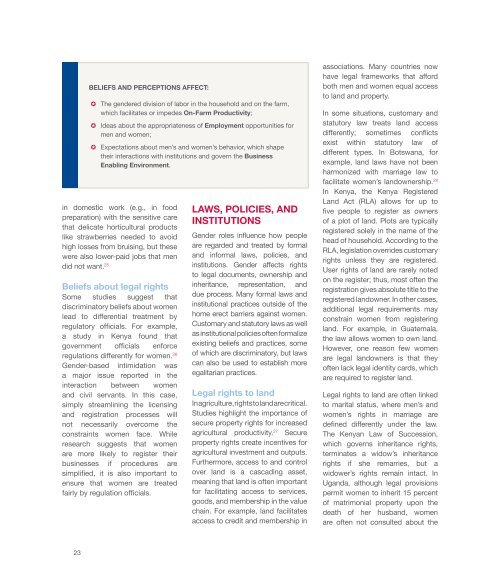promoting gender equitable opportunities in agricultural ... - weman
promoting gender equitable opportunities in agricultural ... - weman
promoting gender equitable opportunities in agricultural ... - weman
You also want an ePaper? Increase the reach of your titles
YUMPU automatically turns print PDFs into web optimized ePapers that Google loves.
BELIEFS AND PERCEPTIONS AFFECT:✪✪ The <strong>gender</strong>ed division of labor <strong>in</strong> the household and on the farm,which facilitates or impedes On-Farm Productivity;✪✪Ideas about the appropriateness of Employment <strong>opportunities</strong> formen and women;✪✪ Expectations about men’s and women’s behavior, which shapetheir <strong>in</strong>teractions with <strong>in</strong>stitutions and govern the Bus<strong>in</strong>essEnabl<strong>in</strong>g Environment.<strong>in</strong> domestic work (e.g., <strong>in</strong> foodpreparation) with the sensitive carethat delicate horticultural productslike strawberries needed to avoidhigh losses from bruis<strong>in</strong>g, but thesewere also lower-paid jobs that mendid not want. 25Beliefs about legal rightsSome studies suggest thatdiscrim<strong>in</strong>atory beliefs about womenlead to differential treatment byregulatory officials. For example,a study <strong>in</strong> Kenya found thatgovernment officials enforceregulations differently for women. 26Gender-based <strong>in</strong>timidation wasa major issue reported <strong>in</strong> the<strong>in</strong>teraction between womenand civil servants. In this case,simply streaml<strong>in</strong><strong>in</strong>g the licens<strong>in</strong>gand registration processes willnot necessarily overcome theconstra<strong>in</strong>ts women face. Whileresearch suggests that womenare more likely to register theirbus<strong>in</strong>esses if procedures aresimplified, it is also important toensure that women are treatedfairly by regulation officials.LAWS, POLICIES, ANDINSTITUTIONSGender roles <strong>in</strong>fluence how peopleare regarded and treated by formaland <strong>in</strong>formal laws, policies, and<strong>in</strong>stitutions. Gender affects rightsto legal documents, ownership and<strong>in</strong>heritance, representation, anddue process. Many formal laws and<strong>in</strong>stitutional practices outside of thehome erect barriers aga<strong>in</strong>st women.Customary and statutory laws as wellas <strong>in</strong>stitutional policies often formalizeexist<strong>in</strong>g beliefs and practices, someof which are discrim<strong>in</strong>atory, but lawscan also be used to establish moreegalitarian practices.Legal rights to landIn agriculture, rights to land are critical.Studies highlight the importance ofsecure property rights for <strong>in</strong>creased<strong>agricultural</strong> productivity. 27 Secureproperty rights create <strong>in</strong>centives for<strong>agricultural</strong> <strong>in</strong>vestment and outputs.Furthermore, access to and controlover land is a cascad<strong>in</strong>g asset,mean<strong>in</strong>g that land is often importantfor facilitat<strong>in</strong>g access to services,goods, and membership <strong>in</strong> the valuecha<strong>in</strong>. For example, land facilitatesaccess to credit and membership <strong>in</strong>associations. Many countries nowhave legal frameworks that affordboth men and women equal accessto land and property.In some situations, customary andstatutory law treats land accessdifferently; sometimes conflictsexist with<strong>in</strong> statutory law ofdifferent types. In Botswana, forexample, land laws have not beenharmonized with marriage law tofacilitate women’s landownership. 28In Kenya, the Kenya RegisteredLand Act (RLA) allows for up tofive people to register as ownersof a plot of land. Plots are typicallyregistered solely <strong>in</strong> the name of thehead of household. Accord<strong>in</strong>g to theRLA, legislation overrides customaryrights unless they are registered.User rights of land are rarely notedon the register; thus, most often theregistration gives absolute title to theregistered landowner. In other cases,additional legal requirements mayconstra<strong>in</strong> women from register<strong>in</strong>gland. For example, <strong>in</strong> Guatemala,the law allows women to own land.However, one reason few womenare legal landowners is that theyoften lack legal identity cards, whichare required to register land.Legal rights to land are often l<strong>in</strong>kedto marital status, where men’s andwomen’s rights <strong>in</strong> marriage aredef<strong>in</strong>ed differently under the law.The Kenyan Law of Succession,which governs <strong>in</strong>heritance rights,term<strong>in</strong>ates a widow’s <strong>in</strong>heritancerights if she remarries, but awidower’s rights rema<strong>in</strong> <strong>in</strong>tact. InUganda, although legal provisionspermit women to <strong>in</strong>herit 15 percentof matrimonial property upon thedeath of her husband, womenare often not consulted about the23










